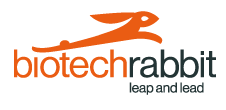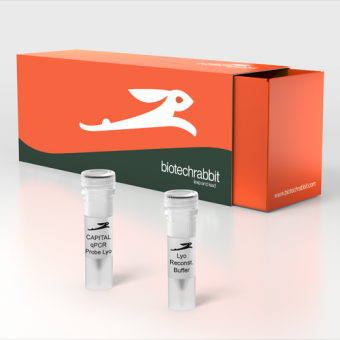
Biotechrabbit은 바이오의약품 및 생명과학 연구를 위한 고급 실험 재료와 서비스를 제공하는 회사입니다.

제품 설명
4X CAPITAL™ qPCR Probe Master Mix
제품 번호
BR0501401 - 200 reactions of 20 µl / 1 ml CAPITAL qPCR Probe Master Mix
BR0501401 - 200 reactions of 20 µl / 1 ml CAPITAL qPCR Probe Master Mix
BR0501402 - 1000 reactions of 20 µl / 1 ml CAPITAL qPCR Probe Master Mix
BR0501403 - 4000 reactions of 20 µl / 1 ml CAPITAL qPCR Probe Master Mix
BR0501501 - 200 reactions of 20 µl / 1 ml CAPITAL qPCR Probe Master Mix LROX
BR0501502 - 1000 reactions of 20 µl / 1 ml CAPITAL qPCR Probe Master Mix LROX
BR0501503 - 4000 reactions of 20 µl / 1 ml CAPITAL qPCR Probe Master Mix LROX
BR0501601 - 200 reactions of 20 µl / 1 ml CAPITAL qPCR Probe Master Mix HROX
BR0501602 - 1000 reactions of 20 µl / 1 ml CAPITAL qPCR Probe Master Mix HROX
BR0501603 - 4000 reactions of 20 µl / 1 ml CAPITAL qPCR Probe Master Mix HROX
제품 특징
Features
- Best in-class performance for both single and multiplex detection
- Convenient master mix with high specificity in pathogen detection
- Highly sensitive for low-abundance DNA targets
Applications
- Standard and fast cycling qPCR with rapid extension rate for early Ct values
- For use on a wide range of probe technologies including Taqman®, Molecular Beacons® and Scorpion® probes
Description
biotechrabbit™ CAPITAL qPCR Probe Master Mix for quantifying genomic, cDNA and viral sequences provides outstanding performance in single and multiplex qPCR. The high sensitivity provided by the mix is ideal for detection of low-abundance DNA targets in various applications, such as pathogen detection.
CAPITAL qPCR Probe Master Mix uses proprietary combination of enzyme and buffer chemistry for efficient extension and early Ct in single and multiplex qPCR. To enable the use of the kit on qPCR platforms with different reference dye concentration requirements, three kit formats are available: a kit containing no ROX, as well as LRox and HRox versions containing ROX in the corresponding concentrations.
Info: Recommended annealing temperature is 2°C above primer Tm (use gradient PCR to optimize the annealing temperature).
Other Information
Component | Composition | CAPITAL qPCR Probe Master Mix | Optimized 4X QPCR Probe Master Mix | LROX / HROX mixes | Rox incorporated in the mix in low / high concentration |
STORAGE | -30°C to -10°C (until expiry date – see product label).
Avoid multiple freeze thaw cycles by preparing aliquots. |
Quality ControlFunctional assayMix tested functionally in qPCR. |
|
Protocols
ROX reference dye
- See PCR cycler instruction for recommended concentration of ROX passive reference dye.
Notes
- For efficient amplification under fast cycling conditions use amplicon lengths between 80 bp and 200 bp.
- The shorter the amplicon length the faster the reaction can be cycled.
- Amplicon lengths should not exceed 400 bp.
- Primers should have a predicted melting temperature of around 60°C, using default Primer 3 settings (http://frodo.wi.mit.edu/primer3/).
- For TaqMan® probes choose probe close to 5’ primer, avoid terminal guanosine residues.
Prevention of PCR contamination
When assembling the amplification reactions, care should be taken to eliminate the possibility of contamination with undesired DNA.
- Use separate clean areas for preparation of samples and reaction mixtures and for cycling.
- Wear fresh gloves. Use sterile tubes and pipette tips with aerosol filters for PCR setup.
- Use only water and reagents that are free of DNA and nucleases.
- With every PCR setup, perform a contamination control reaction that does not include template DNA.
Basic Protocol
- Keep the master mix protected from light until you use it.
- Aliquot the master mix to minimize freeze-thaw cycles and light exposure.
- Thaw on ice and mix very well all reagents. Assemble and keep all reactions on ice.
- Use only high quality optically clear reaction plates and seals designed for fluorescence applications.
- Do not use corner wells or use a more robust seal.
- Reserve plate positions for positive (control DNA) and negative (water or buffer) controls.
- First pipette the primer mixture, then add the template and last the Master Mix.
- Before preparing mixes, calculate the volume needed according to the reaction number plus one extra.
- To have a better correlation, run the reactions in triplets.
Component | Volume | Final concentration |
Primer Mix (Reverse and Forward) | Variable | 100–400 nM |
Too high primer concentrations result in unspecific amplification and should be avoided. |
Specific Probe | Variable | 200 nM |
Template DNA | Variable | 10 pg – 100 ng |
Use diluted or undiluted cDNA from less than 1 µg RNA |
4X CAPITAL qPCR Probe Master Mix | 5 µl | 1× |
Nuclease free water | Variable | |
Total volume | 20 µl | |
- Gently mix the reactions without creating bubbles (do not vortex). Bubbles will interfere with fluorescence detection.
- Place the reaction into the PCR cycler.
Cycling Program
Step | Temperature | Time | Cycles |
Initial activation | 95°C | 2-3 min | 1 |
Denaturation | 95°C | 10–15 s | 40–45 |
Annealing/Extension* | (60-68°C) | 30 s |
*Recommended annealing/extension temperature is primer Tm +2°C. Use gradient PCR to optimize the annealing temperature. Do not use temperatures below 60°C. Do not exceed 30 seconds.
For melt analysis refer to instrument instructions.
Biotechrabbit에서 다양한 제품을 찾아보세요!
Biotechrabbit - Official Distributor in South Korea "Morebio" 한국 공식 대리점 "모아바이오"
